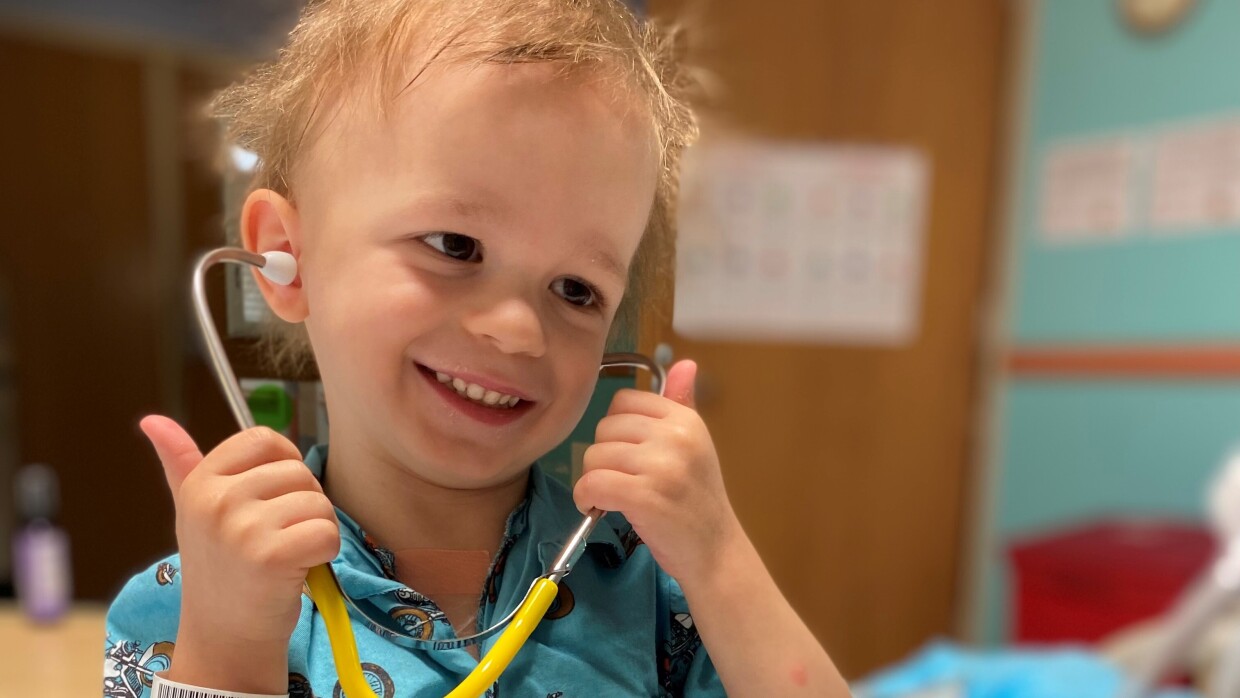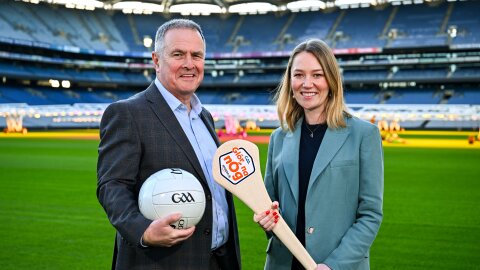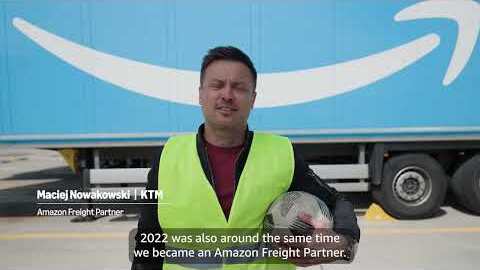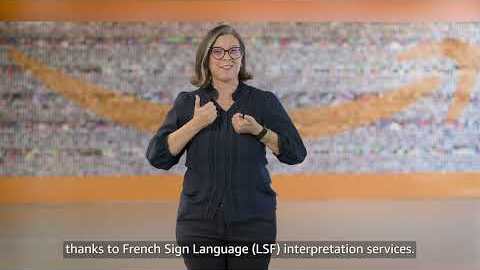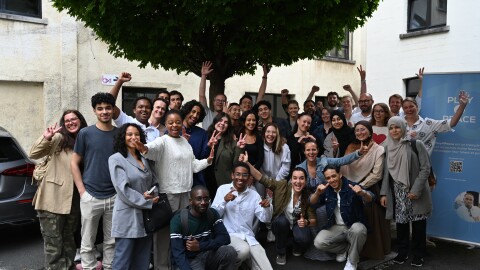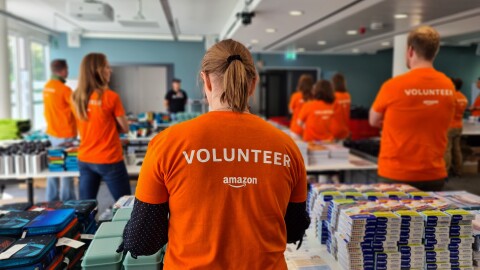Dr. Catherine Bollard has seen the damage that radiation and chemotherapy can do to children fighting cancer. Her childhood best friend passed away after complications from an intense treatment for Hodgkin’s lymphoma.
Now a physician and researcher at the helm of one of the leading childhood cancer hospitals in the U.S., Dr. Bollard has dedicated her life’s work to protecting children from cancer treatment complications. “It became clear to me that we needed therapies that only kill the cancer cells and not healthy bystander cells," she said.
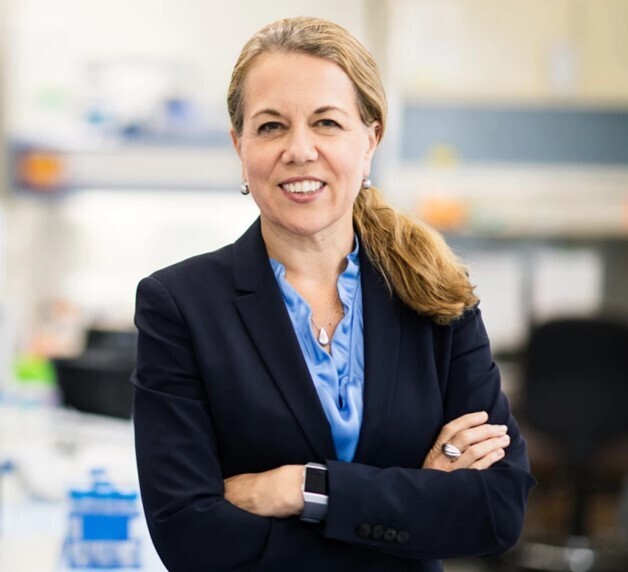
Dr. Bollard serves as director of the Center for Cancer and Immunology Research at Children’s National Hospital in Washington, D.C.She leads research and clinical efforts to fight cancer and other diseases by strengthening a child’s immune system using cell therapy. The hospital is among Amazon’s grant partners in this year’s Amazon Goes Gold campaign, which has donated millions of dollars to support pediatric cancer research worldwide.
Looking back over the last five years, doctors and researchers like Dr. Bollard have been focused on developing new treatments that are better at killing cancer cells with fewer side effects. Among the new targeted therapies is an oral treatment that can reduce injections and, in some cases, remove the need for surgery by shrinking tumors.
Some children undergoing the treatment have experienced fewer side effects than traditional cancer-fighting medicines, and their doctors have been able to reduce the amounts of treatment needed.
Among the young patients benefiting from the new treatment is 3-year-old Wes, who was diagnosed with acute lymphocytic leukemia (ALL) in January 2021. Wes’ parents worked closely with his cancer team at Children’s National Hospital to understand how a more customized treatment plan would help their son without impacting his level of care.
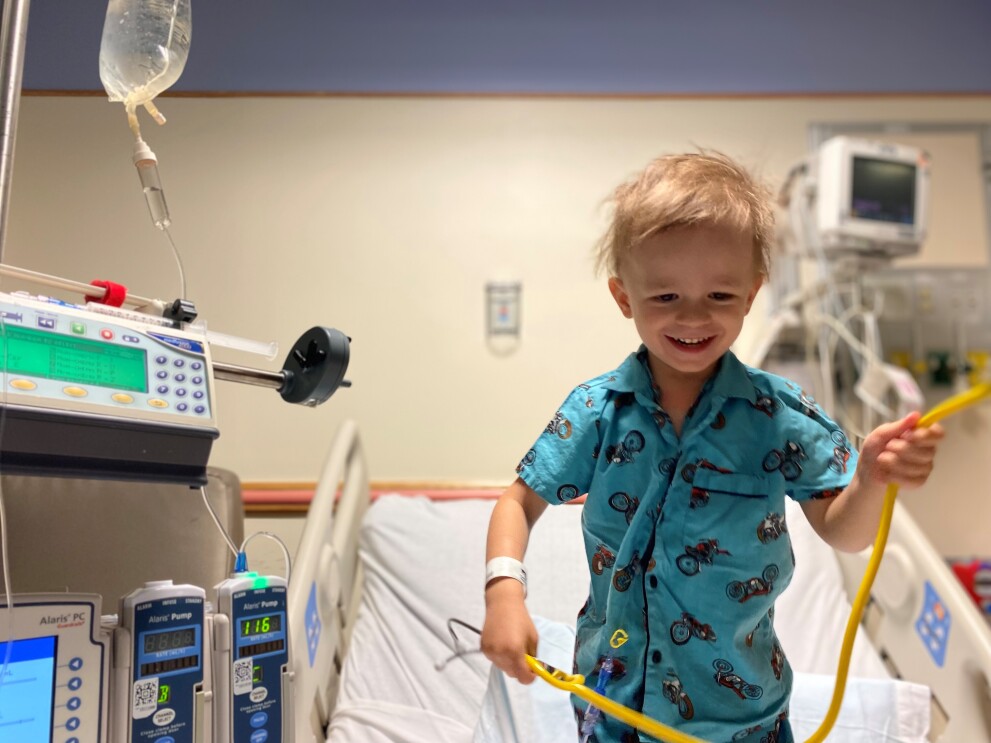
The recent advancements in cancer treatments make it possible for Wes to endure fewer lumbar punctures and chemotherapy, giving him the chance to just be a kid as he fights cancer—and he especially likes the hospital’s art and music therapy programs.
"We are in awe of how the years of research that preceded our son’s diagnosis made things just a little bit easier for Wes,” says his mother, Kate. “Chemotherapy treatments are difficult but necessary, and so any reduction that doesn’t impact outcomes is a small gift to families who are looking at years of outpatient visits.”
At Amazon, children like Wes inspired us to ask:
What could be achieved in the next five years if we all come together to support pediatric cancer research?
Dr. Bollard is optimistic. With new technologies, oncology teams are able to better explore an individual patient’s cancer cells and determine molecular-level matches for specific treatments. In the coming years, these techniques will be used to treat more patients and to test patient cancer cells for more refined treatments.
"I think that [some] cancers may be treated without chemotherapy or radiation. Immunotherapy will become the standard of care and not a last resort,” said Dr. Bollard, who is also a professor of pediatrics and microbiology, immunology, and tropical medicine at The George Washington University.
Doctors and researchers continuing to improve outcomes, lessen toxicity, and increase survivorship for all children—working toward a day when all children with cancer can receive customized treatment that results in a cure.
Gold ribbons are the international symbol to support children fighting cancer. And for the fifth year, Amazon will “go gold” in September for Childhood Cancer Awareness Month to help raise awareness around pediatric cancer and the groundbreaking research being done in the field.
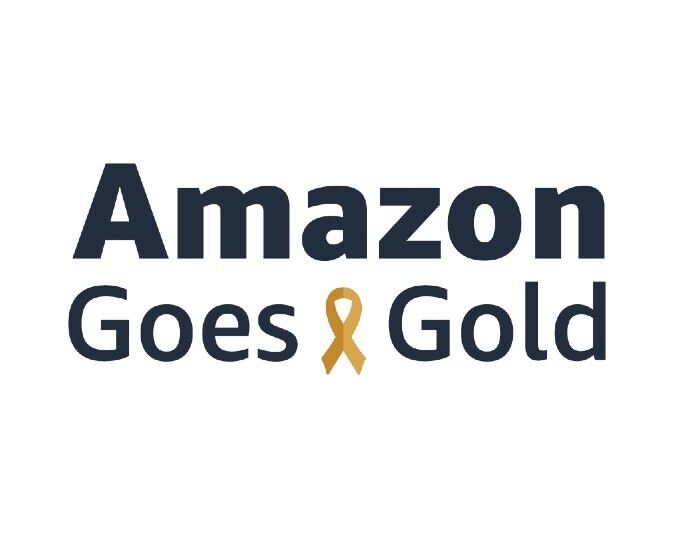
Since 2017, Amazon has donated €9,3million worldwide to more than 150 pediatric oncology programs. Our teams have shipped more than 100 million gold packages in the US with information about our nonprofit and hospital partners. And thousands of employees, partners, and site teams came to work—virtually and in person—dressed in pajamas to stand in solidarity, because pajamas are the battle uniform throughout treatment and recovery for many young patients.
Inspired by the innovative work of physicians and researchers like Dr. Bollard, Amazon is donating more than €4million to seven leading cancer research institutions around the world and in North America shipping 20 million “gold boxes” with customer orders this September to raise awareness about pediatric cancer research.
Customers in the US and EU can join a virtual tour of Amazon's fulfillment centers in September, and we will donate per guest to the International Society of Pediatric Oncology.
Learn more about this year’s Amazon Goes Gold partners and the incredible work they’re doing to advance the field of childhood cancer research:
Children’s Oncology Group
The Children’s Oncology Group (COG) is the world’s largest organization devoted exclusively to childhood and adolescent cancer research. The COG unites nearly 10,000 experts in childhood cancer at more than 220 leading children’s hospitals, universities, and cancer centers across North America, Australia, New Zealand, and Europe in the fight against childhood cancer.The COG has nearly 100 active clinical trials open at any given time. The trials include front-line treatment for many types of childhood cancers, studies aimed at determining the underlying biology of these diseases, and trials involving new and emerging treatments, supportive care, and survivorship.
Today, more than 90% of the 16,000 children and adolescents diagnosed with cancer each year in the United States are cared for at COG member institutions. The COG’s research has turned childhood cancer from a virtually incurable disease 50 years ago to one with a combined five-year survival rate of 80% today.
The organization’s goal is to cure all children and adolescents with cancer, reduce the short- and long-term complications of cancer treatments, and determine the causes to find ways to prevent childhood cancer.
The International Society of Paediatric Oncology
The International Society of Paediatric Oncology (SIOP) is a global society of 2,600 doctors, nurses, allied health professionals and scientists who have dedicated their careers to caring for children with cancer and their families. Our members lead research efforts worldwide to make treatments more effective and less toxic to improve survival and quality-of-life. SIOP offers online training courses on new treatments, provides education through its Annual Congresses, promotes research networking, and works jointly with parents and children to improve advocacy.
The European Society of Paediatric Oncology
The European Society for Paediatric Oncology (SIOP Europe or SIOPE) is the only pan-European organization representing all professionals working in the field of childhood cancers. With more than 2000 members across 36 European countries, SIOPE is leading the way to ensure the best possible care and outcomes for all children and adolescents with cancer in Europe. To achieve this goal, SIOPE addresses the main challenges faced by European pediatric oncology professionals through a multidisciplinary and pan-European perspective.
Through the integration of research, care, and education, SIOPE and the European community of health professionals address the two goals of the next decade: to increase the cure rate and the quality of cure of children with cancer.
Together for Short Lives, UK
Together for Short Lives is the UK charity that stand alongside families, supporting them to make sure they get the vital care and help they need. They offer confidential and emotional support via a helpline, raise awareness and understanding about childhood death, and campaign for policy change.
Starlight Children’s Foundation, UK
Starlight is an organization that delivers happiness to seriously ill children and their families. Starlight programs have brought smiles to hospitalized kids by helping them heal faster, through virtual reality, hospital wear, gaming, Starlight spaces and delivery of distraction therapy materials.
Children’s Cancer and Leukaemia Group, UK
Children’s Cancer and Leukaemia Group (CCGL) is a leading children’s cancer charity in the UK. CCGL have played a key role in major improvements in survival rates and the standards of care for children. They fund and support vital research into childhood and teenage cancers to cure as many children as possible with kinder treatments.
Federación Española de Padres de Niños con Cáncer, Spain
Since 2013, the Federación Española de Padres de Niños con Cáncer’s mission is to be a voice for those children and adolescents with cancer and their families, before Spanish institutions and society, in order to convey their problems and propose solutions. The main goal is to improve the life quality of those minors and their families thanks to comprehensive care from the moment of diagnosis. In particular, the organization coordinates the work of smaller associations in Spain, in order to alleviate the multiple difficulties that the children and their families have to face during the diagnosis of cancer. They aim to inform and raise awareness, and also to promote research by supporting the scientific community to achieve better results.
Gustave Roussy, France
Leading Cancer Centre in Europe, Gustave Roussy, is ranked #5 world's best oncology hospital according to Newsweek magazine and the first one outside the United States. The institute treats patients with all types of cancer at any age and is expert in the treatment of rare and complex tumours. Gustave Roussy’s physicians and researchers devote their energies and their skills to this great challenge: to speed up progress in order to expand the limits of knowledge and offer patients continuing improvements in the specificity of their treatment.
KiTZ Hopp Children Cancer Center Heidelberg, Germany
The Hopp Children's Tumor Center Heidelberg (KiTZ, sponsored by the Heidelberg University Hospital, the German Cancer Research Center and the University of Heidelberg) and the Princess Máxima Center in Utrecht are the two leading top pediatric oncology centers in Europe. Both centers are based on the US model of the so-called “Comprehensive Cancer Centers” (CCCs), which previously did not exist for pediatric oncology in Europe. They are both a therapy and research center and aim to scientifically fathom the biology of childhood cancer and severe blood diseases and to bring promising research approaches to young patients as early as possible - from diagnosis to treatment and follow-up care. The new “KiTZ-Máxima Research Fund” founded by KiTZ and Princess Máxima Center intends to create better framework conditions for European pediatric oncology so that young patients across Europe can benefit from modern therapeutic and diagnostic approaches.
Learn More
The Italian Foundation for Cancer Research, Italy
AIRC - The Italian Foundation for Cancer Research (Fondazione AIRC per la Ricerca sul Cancro, or AIRC) was founded in 1965 and has been committed to fostering cancer research in Italy, and has gradually expanded to include 17 Regional Committees and count over 4,500,000 supporters. AIRC’s mission is to understand, prevent and cure cancer through research and outreach activities. AIRC aims to find solutions to challenges in cancer research, awarding grants to the most deserving projects, as well as supporting training fellowships.
The POLSAT Foundation, Poland
The POLSAT Foundation makes continuous effort to improve the quality of the healthcare for young patients in Poland. They organize large, national campaigns to raise money for medical equipment needed in hospitals and health centers for children. The POLSAT Foundation saves children’s lives and helps with financing the treatment and rehabilitation. Without its assistance, the young patients would lose their chance of recovery. They also, finance medical treatments, medications and therapies. They sponsor the renovation and modernization of medical facilities. The POLSAT Foundation is unique in Poland in terms of large scale assistance in the financing of treatment and rehabilitation.
The Zaczytani.org, Poland
The Zaczytani.org Foundation conducts fairytale therapy sessions for children staying in hospitals, promotes the culture of reading and establishes hospital libraries with books which children can take home. The mission of the Zaczytani.org foundation is to promote reading and social education. They use a book to build qualitative relationships - from relationships with oneself, through relationships in the immediate environment, to relationships between entire communities and institutions. In their activities, they connect the artistic, scientific and business environments, creating social development projects. With their endeavors, they support hospital patients, wards of aid institutions and inspire city dwellers.
DKMS Foundation, Poland
DKMS is an international charity dedicated to the fight against blood cancer and blood disorders. Organization is dedicated to the fight against blood cancer and blood disorders. They create awareness, recruit blood stem cell donors to provide people with a second chance at life, raise funds to cover donor registration costs, and support the improvement of blood cancer therapies through our own research. They also support patients from day one of their diagnosis, providing family and friends with a positive way to get involved by organizing bone marrow donor drives that can enhance your donor search, rally community support and provide hope.
Kapka Naděje, Czech Republic
The foundation fund Kapka Naděje was established in September 2000 based on life experiences of Mrs. Vendula Svobodová. Kapka Naděje helps ill children in many domains- it supports a children’s clinic of haematology and oncology, a cord blood bank and a program of long-term education for chronically ill kids. Moreover, Kapka Naděje buys diagnostic medical devices and other equipments, holds curative stays and also provides psychological help for children and their families during the whole period of treatment and after its end. They currently help in more than 50 hospitals throughout the Czech Republic. During its 21 years of operation, the Kapka Naděje financed the purchase of more than 500 medical devices, implemented more than 200 projects in the field of psychosocial care and supported 3 scientific researches in the field of hematology and oncology.
Kvapka Nádeje, Slovakia
Kvapka Nádeje was founded in 2010 and is aiming to support medical, educational, cultural and social needs of ill children, mainly with oncological diseases. Their goal is to support medical facilities, construction and renovation of medical centers, clinics and dispensaries, purchase of medical equipment (instruments, machines and equipment) and other means and materials intended for equipment and operation of medical facilities for oncological and hematological patients.
Nadácia detského kardiocentra, Slovakia
Nadácia detského kardiocentra (the Children's Cardiac Center Foundation) is a non-profit organization, which works in the Children's Cardiac Center, in the building of the Children's University Hospital in Bratislava. Their goal is to support all activities leading to the improvement of comprehensive care for children with heart defects who are treated at the Children's Cardiac Center. The main principle of the foundation's activities is the creation of financial resources to improve diagnostic and treatment procedures, database processing of medical data, optimization of the stay in their department for children or their parents.


